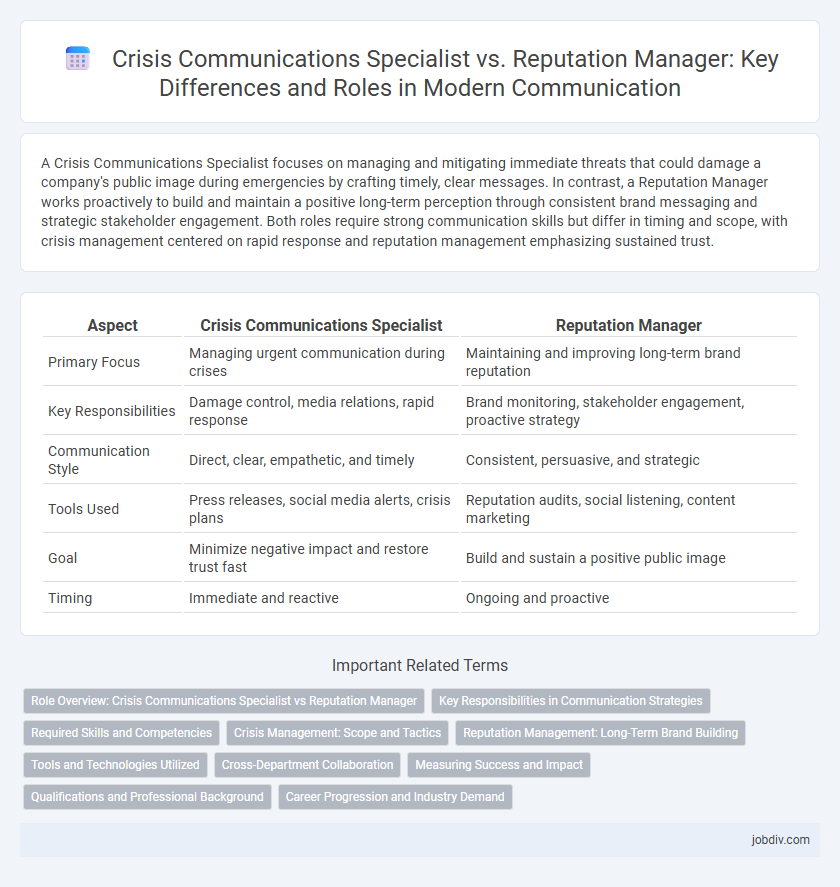A Crisis Communications Specialist focuses on managing and mitigating immediate threats that could damage a company's public image during emergencies by crafting timely, clear messages. In contrast, a Reputation Manager works proactively to build and maintain a positive long-term perception through consistent brand messaging and strategic stakeholder engagement. Both roles require strong communication skills but differ in timing and scope, with crisis management centered on rapid response and reputation management emphasizing sustained trust.
Table of Comparison
| Aspect | Crisis Communications Specialist | Reputation Manager |
|---|---|---|
| Primary Focus | Managing urgent communication during crises | Maintaining and improving long-term brand reputation |
| Key Responsibilities | Damage control, media relations, rapid response | Brand monitoring, stakeholder engagement, proactive strategy |
| Communication Style | Direct, clear, empathetic, and timely | Consistent, persuasive, and strategic |
| Tools Used | Press releases, social media alerts, crisis plans | Reputation audits, social listening, content marketing |
| Goal | Minimize negative impact and restore trust fast | Build and sustain a positive public image |
| Timing | Immediate and reactive | Ongoing and proactive |
Role Overview: Crisis Communications Specialist vs Reputation Manager
A Crisis Communications Specialist focuses on managing and mitigating the impact of unexpected events or emergencies, ensuring clear, timely messaging to protect an organization's image during crises. A Reputation Manager proactively monitors and enhances the overall public perception, strategizing long-term brand integrity through consistent communication and stakeholder engagement. Both roles require expertise in media relations, but the Crisis Communications Specialist operates primarily during high-pressure incidents while the Reputation Manager cultivates sustainable trust over time.
Key Responsibilities in Communication Strategies
Crisis Communications Specialists manage urgent messaging and media relations to control damage and maintain stakeholder trust during emergencies. Reputation Managers develop long-term communication strategies to build and protect brand image, focusing on consistent messaging and proactive public relations. Both roles require expert crisis communication planning, but Crisis Communications Specialists prioritize immediate response, while Reputation Managers emphasize sustained reputation enhancement.
Required Skills and Competencies
Crisis Communications Specialists require strong skills in rapid response, risk assessment, and media relations to manage high-pressure situations effectively. Reputation Managers excel in strategic brand positioning, stakeholder engagement, and long-term image building through consistent messaging and sentiment analysis. Both roles demand exceptional communication abilities, adaptability, and proficiency in digital platforms to maintain organizational trust and credibility.
Crisis Management: Scope and Tactics
Crisis Communications Specialists focus on immediate response strategies, managing urgent information flow and media relations during emergencies to mitigate damage. Reputation Managers adopt a broader scope, implementing long-term tactics aimed at preserving and enhancing organizational image beyond crisis events. Effective crisis management requires integrating rapid communication protocols with sustained reputation-building efforts to protect stakeholder trust.
Reputation Management: Long-Term Brand Building
Reputation management emphasizes sustained efforts to cultivate a positive brand image, leveraging strategic messaging and consistent stakeholder engagement over time. Crisis communications specialists address immediate threats and manage short-term incidents to protect brand integrity during critical moments. Long-term brand building involves monitoring public perception, fostering trust, and implementing proactive initiatives that align with core values and business goals.
Tools and Technologies Utilized
Crisis Communications Specialists leverage real-time monitoring tools such as social media analytics platforms, media tracking software, and rapid response communication systems to manage unfolding situations effectively. Reputation Managers utilize reputation management software, sentiment analysis tools, and customer feedback platforms to continuously assess and improve brand perception. Both roles depend on advanced CRM systems and AI-powered data analysis to inform strategic decisions and maintain stakeholder trust.
Cross-Department Collaboration
A Crisis Communications Specialist coordinates closely with legal, public relations, and operations teams to swiftly manage messaging during emergencies, ensuring consistent communication across all channels. Reputation Managers collaborate with marketing, corporate social responsibility, and human resources to align brand perception initiatives and foster positive stakeholder relationships. Cross-department collaboration enables both roles to harmonize strategic responses, safeguard organizational integrity, and maintain public trust.
Measuring Success and Impact
Crisis Communications Specialists measure success through real-time monitoring of message penetration, stakeholder engagement, and speed of response during critical events. Reputation Managers focus on long-term brand equity metrics, sentiment analysis, and trust indices to assess their impact. Both roles utilize media analytics and survey data to adapt strategies and quantify effectiveness in shaping public perception.
Qualifications and Professional Background
Crisis Communications Specialists typically hold degrees in communications, public relations, or journalism and possess expertise in managing urgent media situations and high-stress environments. Reputation Managers often come from backgrounds in marketing, corporate communications, or brand management, with skills focused on long-term brand perception and stakeholder engagement. Both roles require strong interpersonal communication abilities, but crisis specialists emphasize rapid response and media relations, while reputation managers concentrate on strategic brand positioning and reputation repair.
Career Progression and Industry Demand
Crisis Communications Specialists focus on managing immediate threats to an organization's image during emergencies, requiring skills in rapid response and media relations. Reputation Managers work long-term to shape and maintain a positive public perception through strategic communication and brand management. Career progression often sees Crisis Communications Specialists advancing to broader roles in corporate communications, while Reputation Managers tend to move into senior leadership positions in public relations or corporate reputation, fueled by growing industry demand for expertise in brand integrity and crisis resilience.
Crisis Communications Specialist vs Reputation Manager Infographic

 jobdiv.com
jobdiv.com